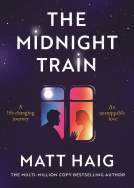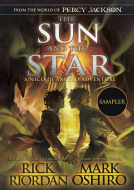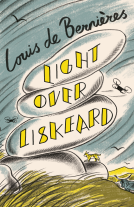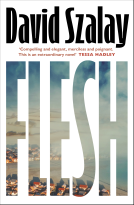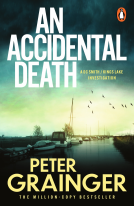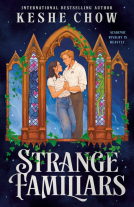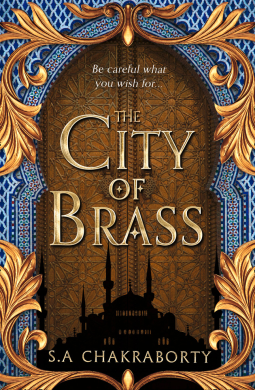
The City of Brass
by Shannon Chakraborty
This title was previously available on NetGalley and is now archived.
Send NetGalley books directly to your Kindle or Kindle app
1
To read on a Kindle or Kindle app, please add kindle@netgalley.com as an approved email address to receive files in your Amazon account. Click here for step-by-step instructions.
2
Also find your Kindle email address within your Amazon account, and enter it here.
Pub Date 14 Nov 2017 | Archive Date 1 Apr 2022
HarperCollins UK, HarperFiction | HarperVoyager
Talking about this book? Use #CityOfBrass #NetGalley. More hashtag tips!
Description
Discover this spellbinding debut from S.A. Chakraborty.
‘An extravagant feast of a book – spicy and bloody, dizzyingly magical, and still, somehow, utterly believable’
Laini Taylor, Sunday Times and New York Times bestselling author
Among the bustling markets of eighteenth century Cairo, the city’s outcasts eke out a living swindling rich Ottoman nobles and foreign invaders alike.
But alongside this new world the old stories linger. Tales of djinn and spirits. Of cities hidden among the swirling sands of the desert, full of enchantment, desire and riches. Where magic pours down every street, hanging in the air like dust.
Many wish their lives could be filled with such wonder, but not Nahri. She knows the trades she uses to get by are just tricks and sleights of hand: there’s nothing magical about them. She only wishes to one day leave Cairo, but as the saying goes…
Be careful what you wish for.
'The City of Brass is the best adult fantasy I've read since The Name of the Wind. It's stunning and complex and consuming and fantastic. You must read it'
Sabaa Tahir, No.1 New York Times bestselling author of An Ember in the Ashes
Available Editions
| EDITION | Ebook |
| ISBN | 9780008239411 |
| PRICE | £2.99 (GBP) |
| PAGES | 400 |
Average rating from 58 members
Featured Reviews
 Caroline M, Reviewer
Caroline M, Reviewer
Every once in a while you start a book by a debut author, and just know that you've come across something special. I had exactly that moment of delight and surprise with S A Chakraborty's The City of Brass (review copy from Harper Voyager). This is a novel with all the magic and wonder of the Arabian Nights, but with a contemporary sub-text.
Nahri lives in Cairo making a living as a healer, but hustling on the side to augment her income as much as she can. She will con rich clients out of as much money as she can, sets them up for burglary and conducts fake rituals on the side for extra cash. She even has an arrangement with her local apothecary to get a cut of the business she sends his way. But as a lone woman with no formal training she struggles to make a living, even though Nahri's secret is that she can diagnose and heal illness in a way that no normal healer can.
Nahri's world is turned upside down when she uses a childhood song during one of her fake rituals. She finds that she's accidentally summoned djinn who are desperate to kill her - but also Dara, a warrior djinn sworn to protect her. Nahri learns that she is the last of the Nahid, one of several races of djinn. The Nahid specialise in healing, and were wiped out following a brutal civil war. The ancestral home of the Nahid - Daevabad - is now controlled by another sect of djinn and there is a price on Dara's head for the crimes he committed during that war. But Daevabad is the only place Nahri can be safe from those seeking to kill her.
In Daevabad Nahri is thrust into djinn politics in a way she never expected. This is a city of warring factions, and as the last Nahid she is welcomed as a saviour and Dara as a hero in some parts of the city. Nahri must find her place in this city fast, and has to call on all her street smarts to survive. She must also cope with her growing - but forbidden - attraction to the charming and heroic Dara.
It's in Chakraborty's world-building of Daevabad that The City of Brass really sings. This is a complex, multi-layered city with a rich history and complex patterns of power and influence. Everyone is flawed and has good motivations for what they do. There is no clear sense of good versus bad here - even Dara has a very dark past. Ghassan, the current ruler, oppresses certain djinn sects, and the humans who live in some parts of Daevabad, and is prone to cruel and arbitrary behaviour. But his family's rule has brought an unprecedented period of peace and stability to the city. We see this most clearly through Ali, Ghassan's second son. He has been brought up to serve in the military,. But his deeply ingrained religious faith and strong sense of right and wrong come under significant pressure as the book progresses.
And The City of Brass is a novel with a nod towards contemporary Middle Eastern politics. This is a book of warring religious sects. Peoples marginalised into ghettos and subject to discriminatory and oppressive laws. Aid money used to buy weaponry. Religious extremism used to justify violence. Chakraborty asks us whether the ends can ever justify the means in messy, complicated world. I can't wait for the next books in the series.
Goodreads rating: 5*
The djinni fantasy I didn't know I'd been waiting for (that's not entirely true: I am always here for excellent djinni fantasy). This is a well-paced, intricate fantasy debut that introduces a glittering world of djinni, where social tensions run high in the eponymous City of Brass. When Egyptian hustler Nahri accidentally summons a daeva - and not just any daeva, but an infamous war criminal to boot - she finds herself pulled into a parallel world she never dreamed of. Her talent for diagnosing illness suggests she may be the last scion of the family who once ruled the daeva, defeated by the desert-born Geziri djinn and hunted down by ifrit. The only way to stay alive is to travel to the City of Brass in the company of its least welcome son - but will the Geziri King really welcome the half-human daughter of the city's former ruling family?
City of Brass tackles questions of racial, gender and religious prejudice with aplomb (and looks set to bring in a view on sexual orientation before it's done). Nahri is a joy and I couldn't possibly resist devout, conflicted Alizayd (although I didn't like Dara as much as I think I was meant to). It introduces its world and then keeps ratcheting the stakes higher and higher until I was squeaking my way through the finale. I'm now on tenterhooks for the sequel! Excellent stuff.
 Bookseller 458350
Bookseller 458350
A superb debut that is wonderfully and expertly written with world building and characters that will draw you in and keep you reading until the final page.
I received a copy of this book in exchange for an honest review. This is a spoiler-free review.
Ever since catching a glimpse of City of Brass’s gorgeous cover, I knew I needed it. Something about it caught my eye and I thought, ‘yep, I’m going to love that book’. I ended up with two copies of this book, my own finished copy and a digital ARC, and I’m not even upset -- it turned out to be the sumptuous, gorgeous fantasy novel I hoped it would be.
To start off, City of Brass is a dense book -- there’s no way around it. Coming in at 544 pages in hardcover, it’s certainly a hefty tome to carry around. But packed within the numerous pages is a beautiful and complex fantasy world. The world building in this book is phenomenal. Apparently Chakraborty is a history buff and it really shows in the world of City of Brass. I find that the best fantasy worlds have a strong history or mythology behind them and this book had both. Now, some readers will not like the level of detail she goes into. If you didn’t like the amount of detail George R. R. Martin puts into food in A Song of Ice and Fire, the descriptions of clothing in Robert Jordan’s Wheel of Time, or the complex cultural structures Brandon Sanderson builds in the Stormlight Archives, this may not be the book for you. While I enjoyed the plot, my favourite part of this book was picking apart the dense history of Daevabad, the political and religious beliefs, and the varying cultures of the groups of citizens. I’m always so impressed when an author can skillfully weave this kind of detail into their story and have it feel natural, rather than an info dump. I’ll admit that I got confused and had to have a little help sorting out some of the politics -- shout out to Naima on Twitter for helping me -- but that didn’t detract from my love of the book. I will say that I wish she had been a little more clear early on when laying out the political tensions that are so key to the plot.
The characters in City of Brass are all complex. I don’t think there are any truly likeable characters in this book -- everyone has some shades of grey to them. Our three main characters are Nahri, Dara, and Ali -- Nahri and Ali serve as our points of view. Nahri is our heroine. She’s young, feisty, prickly, and stubborn to a fault -- did I mention she’s also a con artist swindling the wealthy occupiers of Cairo? I absolutely adored Nahri as a character. She has a serious backbone, is incredibly intelligent, and her sense of humor carries her through the events of the book. She’s far from perfect, in fact there were moments in which I wanted to shake her, but that’s what I loved about her.
I don’t want to say much about our two male leads, however I really liked them both. Again, they’re incredibly complex -- Ali has his extreme religious views and Dara has his terrible past and blossoming interest in Nahri -- but that’s what makes them so fascinating and fun to read about. They’re so different, but also so similar in many ways and I loved the dichotomy they created in their interactions with Nahri. I liked that Chakraborty chose Ali as a POV character rather than Dara, who seemed like the obvious choice to me, because Ali's strict religious convictions and his social status make him an incredibly interesting character. I have so many questions about both characters and I cannot wait to read more about them.
One final note -- I have heard some people say that this book has instalove in it and I don’t think that’s true. There’s absolutely instant attraction, but Nahri is rightfully wary of Dara. Trust is a theme in this book and because of that, I don’t think this qualifies as an instalove relationship.
City of Brass is a beautiful, atmospheric novel that will sweep the reader away with its lush storytelling, dense history, and intriguing politics. If you love non-European settings, political backstabbing, court intrigue, a bit of romance, independent ladies, and lots of magic and magical beings, you’ll adore City of Brass. It’s not the easiest read and many have said that it’s slow to start, but I think it’s absolutely worth your time. The only thing holding this book back from a five star rating is the fact that I had some confusion about the basic politics and social relationships that are key to the book (probably because I devoured the book instead of savouring it).
 Candide K, Media/Journalist
Candide K, Media/Journalist
Here’s a message I felt compelled to send the author:
Hi - I know you're on a Twitter break but I just had to get in touch and say THANK YOU. I have been a fantasy reader for many years and until I read The City of Brass I hadn't realized how incredibly unrepresentative most of what I read was. I grew up in Jordan to a Palestinian single mother and even though she and her family are catholic my cultural references growing up with Arabic for a mother tongue blurred religious lines. I am now 37 and living in London and I find myself using idioms and phrases that I can't always tell if rooted in Arabic literature and stories or the Quran. Reading your book, I saw those phrases again in my favourite setting of all - a fantasy book - and I cannot describe the pure joy I experienced with the cultural and linguistic references (a personal favourite was the Efl/Qefl scene as I grew up watching Egyptian comedy plays and this made me laugh out loud).
For the first time ever, from the hundreds of fantasy books I've read, I could also emphathise and understand the motives of all the main characters in the book. I saw many aspects from childhood friends mirrored all across Daevabad. Thank you incredibly much for introducing me to Nahri, Ali and Dara. I absolutely cannot wait to read what happens next!
Good luck with the rest of the writing and with the trilogy going forward!
 Leonie B, Reviewer
Leonie B, Reviewer
Thank you to Netgalley, SA Chakraborty and Harper Collins for my ARC of City of Brass.
Summary
City of Brass opens in Egypt, Nahri has never believed in the Magic other Egyptians believe in. She doesn't believe in gods and she certainly doesn't believe in Djinn. Working as a healer in the backstreets and bazaars Nahri is just trying to swindle enough people so that she can get enough money to go to Turkey and train as a doctor.
That is until one night when one of her scams goes wrong and she ends up being chased across the world by an evil creature, in the company of a Djinn warrior. Taken to the city of Daevabad Nahri begins to discover secrets about not only herself, but the world of magical creatures too.
Review
City of Brass is easily one of the best books I've read this year. It's the first middle Eastern fantasy I've read and it was everything. How long do I have to wait for the sequel? Another 8 months!!! I'm not sure I can wait that long if I'm honest.
Nahri was a great character, wonderfully feminist and such a cheeky, sarcastic personality. She was perfectly fierce and I loved the banter between her and Daeva.
There was an excellent amount of world building giving me lots of answers which is what I like. Don't get me wrong there was plenty of mystery (particularly that ending!) so it's kept me wanting but it didn't leave me feeling unfulfilled or with more questions than answers. Which for me is what you want in a novel.
If you haven't read this already then you need to do so immediately because you're missing out!
 Stacey C, Reviewer
Stacey C, Reviewer
City of Brass by S. A. Chakraborty is a captivating read and I cannot wait to read the sequel.
City of Brass heavily reminded me of Helene Wecker’s The Golem and the Djinni in terms of the subject matter but it was also unique.
S.A Chakraborty’s skilful world building enables the reader to immerse themselves in the mysterious Middle Eastern kingdom of Daevabad.
Nahri is a thief and accomplished con artist doing what she can to survive. When we first meet her, she is waiting for a ‘mark’ to arrive. The mark is a rich Turkish man who is convinced he is dying and has heard of Nahri’s healing skills.
The man and his brother arrive talking in Turkish unaware that twenty-year-old Nahri has never come across a language she is unable to immediately understand.
Nahri has the unusual ability to be able to sense sickness in others, a skill she uses to her profit. Where there is no sickness Nahri will invent one in order to get money out of her rich marks for a ‘cure’.
“His breath was clean on sickness, and there was an unmistakable brightness in his dark eyes. Despite the graying hairs in his beard, ill-hidden by henna – and the plumpness in his belly, he suffered from nothing other than an excess of wealth.
She’d be glad to help him with that.”
She convinces him that part of the cure should be to leave his house completely empty for a week. During this time, she will steal some items from his house, items he will believe have been carelessly misplaced and won’t miss to her. The money from them will help to pay her rent though.
Nahri scams people to survive but dreams of a life in Istanbul studying real medicine and leaving her unsavoury life behind her. No matter how much she earns though it never seems to be enough to escape.
Nahri is a bit of a loner in Cairo, her only friend is an elderly Jewish pharmacist named Yaqub who clearly cares about her but knows not to ask her too many questions.
“She didn’t question his background and he didn’t ask why a former pickpocket could diagnose illness better than the sultan’s personal physician. Their strong partnership rested on avoiding those two subjects.”
Yaqub worries about her and frequently tries to convince her she needs to get married or follow through on her plan to study medicine in Istanbul. He is concerned about her doing dangerous things like leading a zars.
“Like belief in magic, belief in possession was widespread in Cairo, blamed for everything from a young bride’s miscarriage to an old woman’s lifelong dementia. Zar ceremonies were held to placate the spirits and heal the afflicted woman. “
Nahri doesn’t like in possession but she recognises the ceremony can be a profitable one, so she spied on one once in order that she could earn some money. On this particular night she decides to alter the ceremony slightly by performing it in her native language, a language no one else has ever heard of. In doing this she summons something without meaning to and changes her life forever.
Nahri becomes lost and finds herself in the middle of Cairo’s city of the dead where she encounters a deadly enemy and the being she summoned accidentally during the Zar.
The being she summons turns out to be something from legends she has grown up and he reluctantly becomes her rescuer.
“And they shall control the winds and be lords of the deserts. And any traitor who strays across their land shall be doomed…There was only once creature that line ever referred to... An ancient being said to live for deceiving and terrorizing mankind. A djinn.
Afshin was a djinn.”
The djinn to tell her anything about himself including his name but he insists on incessantly questioning her about her family and her own history.
City of Brass is a split narrative tale. It is split between Nahri and Prince Alizayd al Qahtani. Ali lives in the city of Daevabad a city ripe with inequalities and petty prejudices, a city where everyone has their own agenda. A city that Nahri is about to enter.
I appreciated the unique mythologies presented in City of Brass and the sense of the foreign this book contained.
I would recommend this book, it is simply incredible.
Firstly, I want to talk about the setting(s). This book starts off in Cairo, a place which I rarely read in fantasy novels, at least I rarely read it done well. The Cairo of our main character is described in rich and wonderful detail without feeling like it drags the action down. You get a real sense of the heat and bustle of the city. What I also enjoyed was that Chakraborty decided to set this book in the eighteenth century. It was a wonderful choice of period and, while a lot of this book takes place outside the human world, I’m expecting to see more of this period bleeding through in the later books in the trilogy.
For a fantasy novel of such length, I was surprised that this book only had two points of view. We jump between Nahri and her discovery that the world is far more complicated than she ever realised and Ali, a young ‘prince’ trying to align his conscience with what people tell him is his duty. I was initially worried I would get a bit bored of reading these two perspectives but the story itself is ever changing and wonderfully complex so I felt in the middle of the action the entire time!
Worldbuilding! You can’t write a book this long without some serious worldbuilding. Chakraborty does a phenomenal job of setting up not only the human world but also a kindred fantasy world. I adored the way she described the city and those within it, I thought it made for a rich backdrop on which the story could take place. When I saw how long this book was I was scared I was going to get bogged down in describing the minutia of a fantasy world which is fun for a while but not for over 500 pages. I think this has just the right amount of detail that you can immerse yourself in the world and thus make the story feel so much more real. Top notch worldbuilding.
There is a lot of politics in this book, which is sometimes something that I don’t get on with, I get a bit fed up with all the double talk and trying to seize power and just want to get on with things. In this story, I think the power dynamics are clearly set out in such a way that the politics is easy enough to follow which in turn keeps things interesting for the reader.
There is romance in this story, and yes, it is the forbidden kind. While it does take up quite a bit of the story at times, overall this story is about building relationships, between individuals and between the people of an entire city. There is a theme of trust throughout the novel and I don’t think you can explore that theme fully without also exploring the trust you need to form a romantic attachment.
If you’ve got some time on your hands, or you read incredibly fast, or you just want a challenge I can highly recommend picking up The City of Brass.
My rating: 5/5 stars
I received a digital advanced review copy of this book from the publisher via Netgalley. All opinions are my own.
 Luchia H, Reviewer
Luchia H, Reviewer
This was such a drama and action filled story from the very beginning that there is no way that I couldn’t absolutely fall in love with it. The City of Brass is an epic start to what will probably be one of my favourite trilogies. The story begins in 18th Century Cairo with our main character Nahri, a con artist but one with an unusual talent for sensing what ails someone. Quickly into the story she accidentally summons a ‘djinn’ warrior (based on Islamic mythology). He wants to protect her but in doing so kidnaps her from where she calls home. A lot of the book focuses on Nahri finding out who she is and also growing as a person.
We also have a point of view from that of Ali, another djinn and second son to a djinn king. He’s based in the land of Daevabad which is where the djinn warrior, Dara, eventually takes Nahri too. At the beginning Ali’s perspective focuses on showing us inequality which exists in Daevabad, along with a little insight into the politics and his family. By the time Nahri reaches Daevabad the two points of view become far more coherent.
In terms of the characters, I absolutely loved Nahri. She’s such a strong willed female character, and though she has her faults we do see her grow as a person through the story. Initially I wasn’t a fan of Ali, he’s very opinionated and self-righteous at the beginning but as he starts to see the error in his ways (he is young, after all) he definitely grew on me. There are a lot of secondary characters – some of which are highly likeable and others… not so likeable! I loved the complexity of Dara’s character in particular, he’s had such a troubled past but he always tries to do his utmost to protect Nahri.
Pacing wise, there are parts of the story which flow very quickly and then parts which aren’t as fast paced but are riddled in political issues, the drama being kept fairly consistent throughout. Although a brilliant book, I’d definitely recommend it more for older readers due to the swearing, violence and there are also mentions of rape in the story. With the main character being around 20 I’d also say that this certainly reinforces that the reading age should be on the older side.
One thing I really adored about the story was all the secrets and how they were incorporated into the world by Chakraborty. The secrets and complexity of the story just expand throughout and are incredibly intriguing. They build up to a spectacular peak at the end which made me sad that the book was over – I need the sequel as soon as possible!
 Paein K, Reviewer
Paein K, Reviewer
I received a copy of this book in the November Illumicrate box and intended to read it before the publish date. It's taken me longer than I hoped to read it but then Netgalley sent me an email telling me it was available to review and I jumped at the chance to not only have access to a digital copy but to have another platform to share my review. Luckily my request was granted and I was able to get through the second half of the book a lot faster! Honestly, multiple versions of a book really seems to be the way to go.
I have so many feelings about this book.
I wasn't sure that it would be my kind of thing to start off with as it starts off in Cairo, but it's not historical like I feared and it was pretty captivating right away. I'm not sure why it took me so long to read! Except that maybe it had something to do with the book having a steady pace. You could see things building and twisting but nothing seemed quite frantic. And then everything happened at once and I'm still wide eyed and reeling!
There's obviously so much history here - these guys have been at odds - if not out right war - for centuries and we're suddenly given so much in the epilogue!! I want book 2 was out so that I could keep going! (careful of the other W word...)
This is told in two points of view. Ali - the prince of Daevabad and Nahiri - the not-quite-human girl brought up in the human world alone. As is quite common, their narratives start off worlds apart and they slowly get closer together. What was nice was that they were not love interests to each other as is also rather common.
I found it hard to work out what side I wanted to/ should be on - there seems to be so many! And each side has a differing view of the others. I am obviously lacking in a lot of information, this is going to be a trilogy after all, but at the very least - so far- I am on Nahri's side.
I can see several 'loose ends' floating about that I want to come together so badly, but that epilogue though!
Is she? Isn't she? What's with the water? How did they know? What do these others know? What's going on? I might just wait for all 3 books to be in my possession before I enter this world again. Just so that I can stay in it for as long as possible.
That is, of course, if I can resist jumping back in when book 2 comes around!
I probably wont...
I would say this was for fans of the Rebel of the Sands series and maybe the Girl of Fire and Thorns series too.
It has a similar atmosphere.
 Emma B, Reviewer
Emma B, Reviewer
S.A. Chakraborty's The City of Brass is a story I've read twice now, but it was only on re-reading this book a year or so later, that I really feel like I was able to properly form a conclusion about this story, rate it, and review it. The first time I read The City of Brass it was an eARC (graciously provided by the publisher) with slightly dodgy formatting and a slow, plodding pace that I barely could keep the world building straight in my head because it had been so long since I'd been introduced to it all in the first few chapters of the book. On re-read, I chose to pick up the hardback and the audiobook (magnificently read by Soneela Nankani) and I'm glad that I made the decision to re-read this story because I now better appreciate the skill behind its plotting, world-building, and characterisation.
This book is a book that dumps you into the fantasy scenario and expects you to keep up - if you don't, that's your own problem, and the story doesn't hand-hold you all the way. At times, it can be a little info-dump-y, but that's because the central character, Nahri, is an outsider to the world of the djinn and so when she is introduced to this otherwise invisible world by the djinn slave named Dara, whom she accidentally summons in a moment of peril, we are also being introduced to it alongside her. It's a fairly well-used literary device but it can make the storyline, especially once Nahri and Dara journey to the titular city of Daevabad, a little hard to grasp fully. After two reads, I'm not sure I've even fully grasped the twists and the turns of the world-building but it's something I have complete confidence that Chakraborty understands inside and out and will slowly unravel as the sequel books continue to play out this long history of Daevastana and its warring tribes of peoples.
In terms of characters there are three main protagonists, I'd say: Nahri, a not-so-innocent young woman living in Cairo who has a strange affinity for sensing disease in people but mostly just cons them; Darayavahoush, an enslaved djinn warrior and last of the Afshin (a military caste who were the right hand men of the Nahid people) whose exploits under the command of his previous masters are famed throughout the lands; and Ali, the idealistic second son of the current ruler of Daevastana whose skill with the zulfiqar blade and morally upright(eousness) character make him perhaps a more appealing future ruler than his older brother. From the very opening chapter, Nahri is an outspoken and strong female character - not in that all too tropey, "strong female character" mould but rather in terms of her character and fortitude when she's dropped amidst not only a physically dangerous but, later, also a politically difficult, situation in a world that is so unlike the one she has left behind. She is headstrong and funny and doesn't take anyone's crap, let alone her djinn companion, Dara's.
Unceremoniously and accidentally summoned back into the world by Nahri, Dara finds himself dragging her across the country to Daevabad, the city of his people created from pure Daeva magic, as he suspects she is the daughter of the city's last Nahid, a tribe of peoples who were healers. Suddenly, Nahri's gift for 'sensing' disease seems to make a lot more sense. Dara, however, does not expect a warm welcome in the city as the last time he was there he helped to scourge it - his reputation as a fearsome warrior makes for an uncomfortable welcoming committee by the Al Qahtanis, the current ruling family of Daevabad, of whom Ali is one. Ali was, hands down, my favourite character. For all I enjoyed Dara and Nahri's blossoming relationship, Ali was the idiot character to whom I owe my heart. Intellectually smart, he despises what he sees as the fickleness and show of the court and scorns the world of socialising that his brother, Muntadhir, so loves, instead taking refugee in concentrating on training to become his brother's qaid, the person who will help Muntadhir to rule when he ascends to the throne, essentially the one who will do all of the leg work of actually keeping a city under control, whilst his brother manages the entertaining side of things. It's a role to which Ali is raised, and which he seems suited, but his penchant for trying to help the downtrodden of the city lead him down a slippery slope to (potential) treason, for all his allegedly good intentions. It is following him as he gets in over his head, to put it lightly, that completely endeared me to his character, but it was the development of his storyline and his later interactions with Nahri that cemented him as a favourite. I just worry what the next book will bring.
Moving away from the characters, the world itself is stunning and enchanting, but also deadly. Chakraborty doesn't shy away from showing how dangerous the city is for people who don't conform to its ways. Running underneath the alleged calm there is an undercurrent of distaste and distrust for its current rulers, largely due to the way that they took power, and as a reader you constantly get the sense that there could well be rebellions bubbling beneath the surface - by the factions of ifrit (the cursed Daeva enemies of the Nahids) or the shafit (part-human, part-djinn peoples). None of the characters ever feel quite safe - it seems like everyone is capable of being led, or wilfully going, astray and finding themselves on the wrong side of the king, Ghassan, which is never a good place to be. Ghassan is portrayed as exacting and merciless, everything a strong leader likely needs to be, but it is his tight hold on the city that makes for some more questionable decisions when it comes to his family. Chakraborty never shies away from showing the dark, malicious side of the ruler and his kingdom, but equally never shies away from also showing how capable of inexcusable violence and abuse some of the "good characters" of this story are. It's part and parcel of the world they live in, with its complicated social and political class system where tribe loyalties are tested to the extreme.
In conclusion, The City of Brass marks the first outing in what is bound to be an enthralling and enchanting trilogy of books, richly plotted and masterfully told by S.A. Chakraborty. The complex world which readers are plunged into is never easy, but if you're willing to put the time and effort into immersing yourself in a story whose cultural touchstones may very well not be immediately familiar to you, then you will find your reward in City of Brass and its cast of morally questionable characters. Despite the book's serious maelstrom of political unrest, treasonous plotting, and brutal violence, there are moments of levity, situations that will make you cringe with the awkwardness of it all, and scenes which will make you love the characters for their audacity - if you are willing to put the time into the compelling world of Daevastana and its djinn, you won't be sorry you did.
 Librarian 431790
Librarian 431790
I want to thank the publisher for allowing me to read this book because it's amazing and I'm happy I discovered a great fantasy series.
I loved stories set in Middle East and this one had the perfect setting plus a lot of amazing world building.
The plot was enthralling and entertaining, once you start you're hooked and cannot put the book down.
I loved everything: the cast of well written characters, the plot and the setting.
I look forward to reading the next installment because this one was a great reading experience.
Highly recommended!
Many thanks to HarperVoyager and Netgalley for this ARC. I voluntarily read and reviewed this book, all opinions are mine.
Readers who liked this book also liked:
Rick Riordan; Mark Oshiro
Children's Fiction, LGBTQIA, Teens & YA
